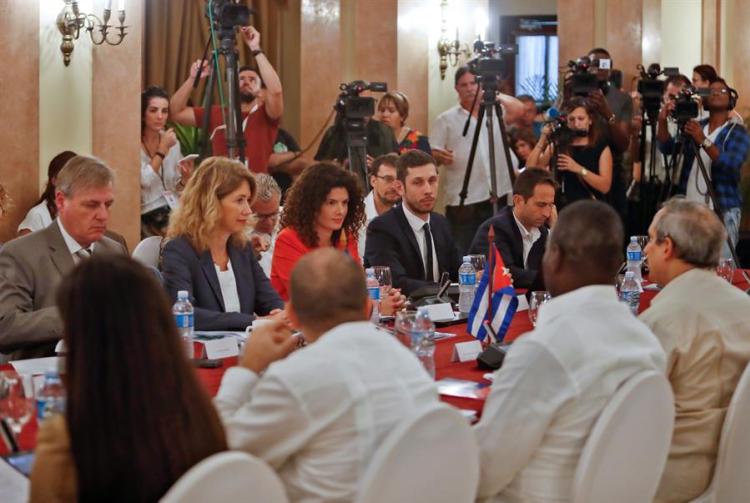The government of Cuba and the European Union (EU) this Friday held in Havana the 2nd Political Dialogue on the Imposition of Unilateral Coercive Measures, amid growing U.S. economic pressures, intensifying the embargo with new sanctions on the island.
A EU delegation headed by the head of the Mexico, Central America and Caribbean Division of the European External Action Service, Katja Afheldt, arrived this week in Havana for the dialogue, preceded by meetings with businesspeople and representatives of civil society affected by U.S. sanctions.
Las medidas coercitivas unilaterales son contrarias al Derecho Internacional y las reglas del comercio. #Cuba y la #UE dialogan hoy sobre su imposición como medio para ejercer coerción política y económica contra los Estados, su aplicación extraterritorial y cómo contrarrestarlas pic.twitter.com/R0K2NGtF7V
— Bruno Rodríguez P (@BrunoRguezP) November 29, 2019
“It is an issue of the greatest importance for Cuba. In the last period there has been a significant increase in the application of the ‘blockade’ and similar hostile measures against Cuba,” said the director general of Multilateral Affairs and International Law of the Cuban Foreign Ministry, Rodolfo Reyes, at the beginning of the meeting.
The controversial Title III
The diplomat thanked the European countries for their support to the resolution that each year his country presents at the United Nations to call for the end of the embargo, as well as the EU’s position against the extraterritorial application of the Helms-Burton Act and its newly reactivated titles III and IV.
Those provisions that Washington kept frozen since 1996 are again being applied since last May and allow filing lawsuits in U.S. courts against companies and individuals that are benefiting from goods and properties nationalized in Cuba after the triumph of the Revolution in 1959.
In the face of the reactivation of these titles, the European bloc warned that it will defend “through all means” its companies with interests on the island, including the application of the “blockade statute,” which prohibits the application in EU territory of sentences in the United States related to Title III and allows defendants to receive compensation in European courts.
Cuba y la UE repasarán acuerdo bilateral con vista puesta en ley Helms-Burton
Nor is a possible lawsuit before the World Trade Organization (WTO) being ruled out, a measure that the EU already resorted to when the Helms-Burton Act was approved in 1996 and was not withdrawn until Washington pledged to withhold the cited Title III
“We welcome the possibility of a dialogue on such an important issue for both parties and for international law and the community,” Reyes added.
The European representative pointed out that the issue of unilateral coercive measures is increasingly in force and that the extraterritorial effects of the U.S. embargo “are illegal and violate the norms of international trade.”
Escalation of the embargo
“Unfortunately, since we met last time (in Brussels in November 2018) we have seen an escalation of the embargo, in force for six decades,” said Afheldt.
In the meetings prior to the institutional dialogue, the EU representatives verified that “the embargo doesn’t understand the Cuban economy,” imposes economic hardships on the Cuban people and has “marked effects” on providing health services to the population, the diplomat said.
The effects of the Helms-Burton Act have already been felt by European companies such as the Spanish hotel companies Meliá, Iberostar and Barceló or the French Accor, which have been sued in U.S. courts, although without court rulings for the time being.
This Friday’s talks are part of the five spheres of bilateral dialogue established in the Agreement on Political Dialogue and Cooperation that provisionally came into force at the end of 2017 and that include issues such as human rights and sustainable development, among others.
The EU representative considered that these dialogues are always “valuable and constructive” because they help the parties “understand each other better and find common ground in many matters.”
“It is important that we continue to review and improve these dialogues,” she added.
The administration of Donald Trump justifies its renewed hostility towards Havana and the increase in sanctions because of Cuba’s supposed logistical support to keep Venezuelan President Nicolás Maduro in power, an allegation that the Cuban government rejects.










